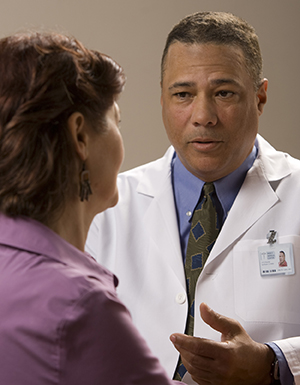After Treatment for a Mouth or Throat Tumor
Treatment for a tumor may change the way you speak, chew, or eat. If so, your healthcare team will show you new ways to do these important tasks. Family, friends, and other people you trust can also help you adjust.
 |
| Talk with your healthcare team about what lies ahead. |
Help with daily tasks
Surgery to remove a tumor may make simple tasks harder to do for a while. Your therapists can help you relearn how to chew or swallow food if needed. If you have a stoma or a feeding tube, your healthcare team will show you how to care for it. If you have dentures, you may need to get new ones. And you may need to practice moving muscles in your neck or face. Members of your healthcare team can help. Ask them about home nurses and health aides if you need help at home.
Help with speaking
If you have your larynx removed, it will change the way you speak. But you can learn to speak again. A speech pathologist can help you use 1 or more of the following:
-
Electrolarnyx. This is a device like a microphone that you hold up to your throat when you want to talk.
-
Esophageal speech. This creates speech using air forced up from your esophagus.
-
Voice prosthesis. This is a special valve placed inside your throat to help you speak.
While you are learning speaking methods you may have to depend on other ways to communicate. These can include electronic devices or writing things down on paper. Or having a trusted family member or friend talk with providers. Your healthcare provider can help you decide what works best for you.
Help with emotional health
You may have strong feelings about your cancer, both during and after treatment. You may feel fear, anxiety, and depression. Your loved ones may feel these same emotions. You can help manage these feelings by having the support of friends and other family members. Share your concerns with your healthcare team.
Strong emotions are common for anyone coping with cancer. Ask your healthcare team for local and online support groups for you. And for your family members too. Sometimes it helps to have someone who is going through a similar experience. Ask for the help of a mental health professional. They can help you manage the physical and emotional challenges you and your family are facing.
Call your healthcare provider right away if any of the following occur:
-
Thoughts of suicide
-
Trouble sleeping or no appetite
-
Confusion
-
Lack of interest in all activities. Or can't find pleasure in things you used to enjoy.
-
Restlessness
-
Can't do your daily activities because you feel distressed
-
New or unusual behaviors or emotions that concern you
-
Intentional isolation from friends or family
Following up
In the future, you may need more exams, speech or physical therapy, X-rays, tests, or treatment. Be sure to follow up with your healthcare team as directed. It’s also important to do what you can to improve your health. This includes healthy eating, regular exercise, and staying away from first- or second-hand cigarette smoke. Smoking after your cancer surgery increases your risk of developing another new cancer.